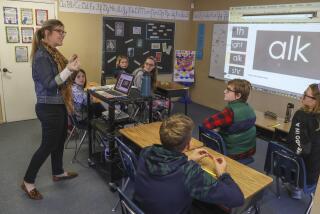School librarian helps students struggling with reading
After each school day, librarian Dinora Arteaga leads a special reading program for a dozen kindergarten and first-grade students, along with their parents. Their goal: learning 10 new words a week.
Arteaga works almost exclusively with Spanish-speaking parents whose children are struggling to read, either in Spanish or English. Operating out of a tiny library at Evelyn Thurman Gratts Primary Center, a public charter school near downtown, her group meets on Mondays, with one-on-one sessions later in the week.
Families who enter the reading program do so voluntarily after a teacher recommends a child, based on reading scores. A student’s progress is measured on an alphabetical scale that begins with A. By the end of first grade, students should read at level J.
Many of the students in the program are struggling to get past B, and Arteaga pushes them to progress by one letter during their eight weeks together. Last year, 18 of 20 first-graders and eight of 15 kindergartners fulfilled that goal.
On a Friday afternoon in October, Arteaga was helping 6-year-old Spanish-speaker Heily Ramirez, who was confused by A’s, E’s and the sound of C in her native language.
Hunched over the edge of the table, Heily stared at the work sheet, paused, tugged at her vest and finally spoke: “Mamá hace la cena.” She’d pronounced the words right. Understanding the sentence, “Mother cooks dinner,” she looked over to her mother to find a proud smile.
Maria Ramirez was born in El Salvador. Her older daughter, 26, buys books for Heily. But it’s often up to Ramirez and her husband to read to Heily. From Arteaga, she’s learned strategies to ensure that Heily reads along and comprehends.
“I’ve changed my work schedule to make Mondays and Fridays open to have more time to help her, to be here,” Ramirez, who works as a supermarket cashier, said in Spanish. “And I’ve seen progress in her.”
“Heily can read and write with more fluency,” Ramirez said. “I just want her to keep learning more.”
Arteaga, a former assistant librarian, was hired as Gratts’ sole librarian in December 2010. Principal Andrea Purcell asked Arteaga if she wanted to lead an after-school reading program — scheduled over eight weeks — for students having trouble keeping up with their lessons.
“Some kids just need more support and time,” Purcell said. If the school can give it to them, she said, “that’s going to give kids more opportunity and motivation to practice.”
Born in East L.A. to immigrants from El Salvador and Guatemala, Arteaga recognized the students’ frustration. She had never felt comfortable speaking publicly until she forced herself to take a storytelling class at Cal State L.A.
“There’s not a day that goes by now that kids aren’t sitting here while I’m reading to them,” Arteaga said. She caps each two-month session with an eye-opening field trip to the public library.
“Some parents think they will be reported to immigration if they go there or it will cost them money,” Arteaga said. “But I make them go and check out books there, so they have to come back in a couple of weeks.”
Arteaga’s involvement in the reading program is fully funded by a grant from the Los Angeles Times Family Fund.
Through the generosity of Times readers and a match by the McCormick Foundation, $424,500 was granted to local literacy programs this year as a result of the Los Angeles Times Holiday Campaign.
The Holiday Campaign, part of the Los Angeles Times Family Fund, a McCormick Foundation Fund, raises contributions to support established literacy programs run by nonprofit organizations that serve low-income children, adults and families who are reading below grade levels, at risk of illiteracy or who have limited English proficiency.
Donations are tax-deductible as permitted by law and matched at 50 cents on the dollar. Donor information is not traded or published without permission. Donate online at latimes.com/donate or by calling (800) 518-3975. All gifts will receive a written acknowledgment.
More to Read
Start your day right
Sign up for Essential California for news, features and recommendations from the L.A. Times and beyond in your inbox six days a week.
You may occasionally receive promotional content from the Los Angeles Times.






